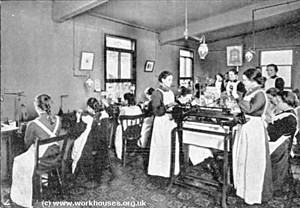
The knitting home at 122 Lower Clapton Road provided employment for 20 women who had come from Salvation Army maternity homes.
© unknown
By Natasha Lewer
“Can’t you have your next servant from Dalston?”
Sometimes the father of the baby was traced by Salvation Army officers and persuaded to marry the mother; at other times the women returned to their own families. But in the majority of cases, the Salvation Army used its extensive network of contacts to find a “situation” for the woman, which was usually a live-in job as a domestic servant, thus turning her into a responsible, self-supporting citizen. “If you can’t adopt a baby, can’t you have your next servant from Dalston?” ran one of their slogans.
Foster mothers
The Salvation Army claimed that it was important to establish the “deep mother-instinct”, and that the unmarried mothers in their maternity homes were always “near at hand to the little babe of which they are ‘mother’”. However, in practice this was not always possible, as a live-in domestic servant could not take her child with her, and many mothers found themselves soon separated from their babies. ‘Foster mothers’, or ‘nurse mothers’ were employed to look after the babies for five shillings a week (going up to eight shillings by 1911), with the mother taking full financial responsibility, which meant that she had to hand over as much as 80% of her weekly wages to the foster mother. Inventions like ‘self-denial week’, when mothers were encouraged to give money to the Salvation Army, further depleted their wages.
At the foster mothers’ homes, babies were bottlefed, and the absence of nutritious formula milk, coupled with primitive hygiene practices, probably contributed to the mortality rate, which was as high as 50%. There was a public outcry when one baby in the care of a foster mother died of malnutrition, although the Salvation Army were found not to be to blame. Eventually a ‘Baby Home’ was opened in Hackney so that babies could be cared for under direct supervision of Salvation Army officers. Other babies were informally adopted by Salvation Army couples, but not in great numbers.
Industries
Some women were seen as unsuited to becoming domestic servants – those who had a physical disability, or were deemed “too clumsy” – and the Salvation Army set up small industries to provide employment for them. These included ‘knitting homes’ in Laura Place, Lower Clapton, and at 122 Lower Clapton Road; a knitting factory, employing 20 women, in St Kilda Terrace, Upper Clapton; a laundry, employing 30 women, at 14 Maury Road, Stoke Newington; and a bookbinding works in Goswell Road, in nearby Islington, where all the Salvation Army publications were bound, with 100 women “doing the folding and sewing”.
Image reproduced courtesy of www.workhouses.org.uk.